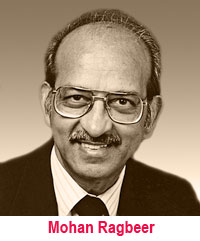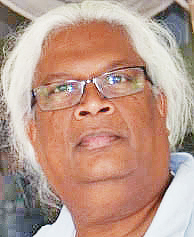Opinions
More Bullying

Trump has begun the New Year with an impulsive drone attack on Jan. 3 that killed Iranian commander Qassem Suleimani, and Abu Mahdi al Muhandis (born Jamal Jaafar Ibrahimi), the Iraqi Kata’aib Hezbollah leader whose forces defeated ISIS). Trump and Secretary of State Pompeo now gloat over these assassinations as a triumphal response to the killing of a contractor at the US embassy in Baghdad by crowds protesting the late December US killing of 25 Hezbollah militiamen. What would Trump’s reaction be, I wondered, if the tables were turned and US equivalents
slain? The Iraqi uprising in Baghdad was a show of defiant helplessness as the superpower continues to wreak havoc on their soil and kill their kindred. US relations with Iran had moderated following the nuclear treaty with the West, despite hostility by US ally Israel against Iranian interests in Syria and Iraq. Trump stormed into the White House and summarily withdrew the US from that treaty, with the same disdain for the truth that George Bush had shown in 2003 when he, with Tony Blair, invaded Iraq to eradicate imaginary weapons of mass destruction.
Trump began to echo Netanyahu’s views on Iran and relations plummeted, punctuated with clashes in the Persian Gulf, Iran destroying a US drone over its territory last September; Trump overlooked that, a measured and settling response.
These killings are the opposite and seem unjustified as there is no declared war between them. Iran might be mouthy and obnoxious, but far from a threat to world safety, unlike America, certainly so, with over 50 offensives against others since WWII. Besides, the US has no proprietary right in the Middle East (ME) or elsewhere outside the USA. If business takes it elsewhere, it should pursue business, not regime change to suit its global aims or Netanyahu’s dreams. The word “diplomacy” is plainly not in their vocabulary. The US is in the ME, for decades now, for Israel and OIL!
Most of the ME became colonies of Britain and France after WW1, achieving independence as mainly secular socialist states. Afghanistan, for example, had social reforms since the sixties that promoted education and gender equality. The Nur Mohamed Taraki regime in 1980s, with USSR support, continued these, adding land reform and improved prospects for the masses, but CIA/ISI (Pakistan) intervened, supporting Osama bin Laden’s revival of Islamic jihad, dormant for centuries, armed his mercenaries and extremists, the mujahideen, Reagan adopting them, gushing, “To watch the courageous Afghan freedom fighters battle modern arsenals with simple hand-held weapons is an inspiration to those who love freedom”! (Afghan aid was first given by Jimmy Carter!) Some of the funding came and continues from a US-instigated expansion of opium cultivation and heroin sales by Afghanistan and Pakistan. The ME wars were a hot component of the Cold Wars, cost trillions and enriched American military industrialists.
When the Soviets left, Afghan militias, now bristling with US arms, fought for control; Islamic rightists, the Taliban, won, and established a theocracy. al Qaida and ISIS followed after Bush destroyed secular Iraq, but refused to leave the Gulf, despite bin Laden’s repeated entreaties to quit Islam’s Holy Land. In a parallel development in Palestine, Israel embraced Ahmed Yassin’s Hamas as an Islamic rightist group opposed to Arafat’s secular PLO. Hamas survived, to needle Israel. Thus, Islamic extremism is very much a product of US foreign policy. Trump does not remember this. The American, Gore Vidal, referred to the USA as the United States of Amnesia, while China’s Zhou En Lai snidely remarked, “One of the delightful things about Americans is that they have absolutely no historical memory.”
Wondering why Trump’s sudden attack, I fantasised that it must have come following a call by seven of the largest military industrialists, and the NRA offering Trump a means to ensure a second term: increase our orders, invade Iran, crap on Muslims, and spit on impeachment.
Eisenhower must be turning in his grave! He had said, on January 17, 1961, on leaving office: “…we must guard against the acquisition of unwarranted influence…by the military–industrial complex. The potential for the disastrous rise of misplaced power exists, and will persist…Only an alert and knowledgeable citizenry can compel the proper meshing of the huge industrial and military machinery of defense with our peaceful methods and goals so that security and liberty may prosper together.”
In the aftermath, Iran has stepped back from nuclear obligations, Iraq has voted to expel US forces, Trump has promised Iraq sanctions worse than Iran’s, and attacks on 52 sites in Iran. Interesting times, with a lunatic in the White House.
Trump began to echo Netanyahu’s views on Iran and relations plummeted, punctuated with clashes in the Persian Gulf, Iran destroying a US drone over its territory last September; Trump overlooked that, a measured and settling response.
These killings are the opposite and seem unjustified as there is no declared war between them. Iran might be mouthy and obnoxious, but far from a threat to world safety, unlike America, certainly so, with over 50 offensives against others since WWII. Besides, the US has no proprietary right in the Middle East (ME) or elsewhere outside the USA. If business takes it elsewhere, it should pursue business, not regime change to suit its global aims or Netanyahu’s dreams. The word “diplomacy” is plainly not in their vocabulary. The US is in the ME, for decades now, for Israel and OIL!
Most of the ME became colonies of Britain and France after WW1, achieving independence as mainly secular socialist states. Afghanistan, for example, had social reforms since the sixties that promoted education and gender equality. The Nur Mohamed Taraki regime in 1980s, with USSR support, continued these, adding land reform and improved prospects for the masses, but CIA/ISI (Pakistan) intervened, supporting Osama bin Laden’s revival of Islamic jihad, dormant for centuries, armed his mercenaries and extremists, the mujahideen, Reagan adopting them, gushing, “To watch the courageous Afghan freedom fighters battle modern arsenals with simple hand-held weapons is an inspiration to those who love freedom”! (Afghan aid was first given by Jimmy Carter!) Some of the funding came and continues from a US-instigated expansion of opium cultivation and heroin sales by Afghanistan and Pakistan. The ME wars were a hot component of the Cold Wars, cost trillions and enriched American military industrialists.
When the Soviets left, Afghan militias, now bristling with US arms, fought for control; Islamic rightists, the Taliban, won, and established a theocracy. al Qaida and ISIS followed after Bush destroyed secular Iraq, but refused to leave the Gulf, despite bin Laden’s repeated entreaties to quit Islam’s Holy Land. In a parallel development in Palestine, Israel embraced Ahmed Yassin’s Hamas as an Islamic rightist group opposed to Arafat’s secular PLO. Hamas survived, to needle Israel. Thus, Islamic extremism is very much a product of US foreign policy. Trump does not remember this. The American, Gore Vidal, referred to the USA as the United States of Amnesia, while China’s Zhou En Lai snidely remarked, “One of the delightful things about Americans is that they have absolutely no historical memory.”
Wondering why Trump’s sudden attack, I fantasised that it must have come following a call by seven of the largest military industrialists, and the NRA offering Trump a means to ensure a second term: increase our orders, invade Iran, crap on Muslims, and spit on impeachment.
Eisenhower must be turning in his grave! He had said, on January 17, 1961, on leaving office: “…we must guard against the acquisition of unwarranted influence…by the military–industrial complex. The potential for the disastrous rise of misplaced power exists, and will persist…Only an alert and knowledgeable citizenry can compel the proper meshing of the huge industrial and military machinery of defense with our peaceful methods and goals so that security and liberty may prosper together.”
In the aftermath, Iran has stepped back from nuclear obligations, Iraq has voted to expel US forces, Trump has promised Iraq sanctions worse than Iran’s, and attacks on 52 sites in Iran. Interesting times, with a lunatic in the White House.
Replacing our core with peripherals
 Romeo Kaseram
Romeo Kaseram
Since he was dead and no longer had a say in decisions made in this world, his brood of children made the unilateral decision to Live Stream his funeral on Facebook. I am always surprised, and with an accompanying sadness, at how technology infiltrates, and then replaces, that which we should really value in our lives.
The shock of our neighbour back home having his funeral broadcast globally hit me, with its mix of sorrow, following his passing last year as the last representative of the generation born after our ancestors arrived from India.
For a living, he thrived on his fishing boat, and spent so much time at sea he walked on land on his thin, long spidery legs with a sea-gait, always seeking out balance, left foot compensating for right, as if the solid ground was on a constant roll. Growing up back home, it was a joy to chase, and be chased by his brood of children, during games of hide-and-seek. We ran through corridors and many windings of his seine, a thousand feet and more of fish net strung out to dry on clothes lines, and pockmarked with dead fish and scales made silver with sunlight. He would stand aside and let us stampede through, putting away his mending needle for a moment to take the opportunity to light up a cigarette. The smell that emerged was burnt asphalt mingling into the mix of sea-rot from the nets.
He smoked the old way, which he said was how the ancestors did it, by cupping the left hand into a fist. It was a large hand, the fingernails curved and edged with dirt, gripping the cigarette in an air-tight seal between the forefinger and middle finger. For each inhalation, he drew deeply from the circle formed with the curvature of thumb and forefinger, then closed his eyes, and exhaled upwards towards the corona of the heating sun drying out the tiny fish, and an occasional dead sea-horse, knotted into his fishing net.
His brood of children grew up and away from the ocean. Perhaps he was disappointed not a single son took an interest in succession, choosing to hear the call of the honking car horns in city, and not the sighs from rolling waves. I am unsure what happened to his fishing boat in the end.
However, extrapolating from the wrecks I have witnessed of crafts dragged onshore and abandoned, stranded in deep sand under coconut trees, with its peeling paint, and the glory of its name fading on the sides, I could only imagine how difficult it was for him to give up the trade. The fishing net became a pile gathering dust underneath the house. I imagine each morning he watched the brood heading out to office jobs in the capital city as he cupped his cigarette, and drank black coffee out of his sea-rusted, enamel cup.
He grew old as all people do, while his brood thrived. Where his fishing nets were hung out to dry and for mending, now makeshift shelters went up to house the acquisition of his thriving brood – vehicles ranging from works-in-progress to cars that spluttered, coughed, and were revved with relief after the engine fired. Where the fishing nets were mended, the brood tinkered under hoods; once filled with the scent of the sea and the haunting stink of dead fish, the front yard now smelled of gasoline and the reek of monoxide.
Cameras began appearing on the periphery where members of the brood began repairing vehicles. Where we ran with abandon as youngsters through corridors of fish nets now was replaced by vehicles standing shoulder to shoulder, and policed by cameras, with sensors turning on bright floodlamps when activated.
Even as the brood thrived in their new, technological world, our neighbour declined while wasting away in his hammock. The layer of dust thickened on the fishing net even as his hair grew thin. Networks of veins became prominently raised under the wrinkling skin on his arms that once-upon-a-time heaved in the seine heavy with struggling fish, and dead-weighted with sea-water.
It is understandable that he wasted away in his last days, confined to his bed, weighted down with the body’s decay and its burden of watching the brood slip beyond his reach. Now the brood was fully engaged in their adult lives, finding the time left at the end of the day too little, the distances to far, to visit the old man.
It came to pass an enterprising member of the brood discovered the convenience of placing a camera in his room with its feed sent out to the siblings. It removed the physical presence to visit the dying man. Conversations with him were sanitised by a microphone. Where once we ran through his fishing nets, calling to each other, disturbing his patient knitting with needle and thread, now electronic faces ran among monitors, and voices were amplified from distant locations.
Our neighbour passed away in his sleep. A few members of the brood, too far removed, viewed his committal to the flames via Live Stream.
He smoked the old way, which he said was how the ancestors did it, by cupping the left hand into a fist. It was a large hand, the fingernails curved and edged with dirt, gripping the cigarette in an air-tight seal between the forefinger and middle finger. For each inhalation, he drew deeply from the circle formed with the curvature of thumb and forefinger, then closed his eyes, and exhaled upwards towards the corona of the heating sun drying out the tiny fish, and an occasional dead sea-horse, knotted into his fishing net.
His brood of children grew up and away from the ocean. Perhaps he was disappointed not a single son took an interest in succession, choosing to hear the call of the honking car horns in city, and not the sighs from rolling waves. I am unsure what happened to his fishing boat in the end.
However, extrapolating from the wrecks I have witnessed of crafts dragged onshore and abandoned, stranded in deep sand under coconut trees, with its peeling paint, and the glory of its name fading on the sides, I could only imagine how difficult it was for him to give up the trade. The fishing net became a pile gathering dust underneath the house. I imagine each morning he watched the brood heading out to office jobs in the capital city as he cupped his cigarette, and drank black coffee out of his sea-rusted, enamel cup.
He grew old as all people do, while his brood thrived. Where his fishing nets were hung out to dry and for mending, now makeshift shelters went up to house the acquisition of his thriving brood – vehicles ranging from works-in-progress to cars that spluttered, coughed, and were revved with relief after the engine fired. Where the fishing nets were mended, the brood tinkered under hoods; once filled with the scent of the sea and the haunting stink of dead fish, the front yard now smelled of gasoline and the reek of monoxide.
Cameras began appearing on the periphery where members of the brood began repairing vehicles. Where we ran with abandon as youngsters through corridors of fish nets now was replaced by vehicles standing shoulder to shoulder, and policed by cameras, with sensors turning on bright floodlamps when activated.
Even as the brood thrived in their new, technological world, our neighbour declined while wasting away in his hammock. The layer of dust thickened on the fishing net even as his hair grew thin. Networks of veins became prominently raised under the wrinkling skin on his arms that once-upon-a-time heaved in the seine heavy with struggling fish, and dead-weighted with sea-water.
It is understandable that he wasted away in his last days, confined to his bed, weighted down with the body’s decay and its burden of watching the brood slip beyond his reach. Now the brood was fully engaged in their adult lives, finding the time left at the end of the day too little, the distances to far, to visit the old man.
It came to pass an enterprising member of the brood discovered the convenience of placing a camera in his room with its feed sent out to the siblings. It removed the physical presence to visit the dying man. Conversations with him were sanitised by a microphone. Where once we ran through his fishing nets, calling to each other, disturbing his patient knitting with needle and thread, now electronic faces ran among monitors, and voices were amplified from distant locations.
Our neighbour passed away in his sleep. A few members of the brood, too far removed, viewed his committal to the flames via Live Stream.
